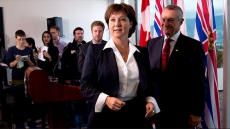VANCOUVER - British Columbia's education minister is edging away from his long-held position not to legislate striking teachers back to work, in the face of a union buoyed by a landslide vote and a multimillion-dollar cash infusion.
Peter Fassbender has pledged for months not to impose a settlement on teachers, describing his strong stand as imperative to getting a negotiated agreement and breaking the "dysfunctional" labour-relations cycle.
But his tone changed on Thursday, after union members overwhelmingly approved the B.C. Teachers' Federation proposal to start the school year for half-a-million students if government accepts binding arbitration.
"The reality is, government has the ultimate ability to legislate in any situation," Fassbender said in an interview when asked if he would open the door to the option. "We want a negotiated settlement."
He wouldn't say whether he's had discussions with the premier about recalling the legislature early or how government would respond if the strike continues into the fall sitting of the house, set for the first week of October.
"As government, we talk about a lot of things. But I'm not going to get into speculating on any of that."
Premier Christy Clark said later in the day she thinks she can get a negotiated deal before she travels to India for a trade mission that's scheduled to start Oct. 9.
"I'm very hopeful that schools will be back, in fact, I'm certain schools will be back in session by the time I go to India," she told reporters.
"It's a major, major source of international students for us, potentially. The fastest-growing middle class in the world and not enough educational facilities. They need to partner with British Columbia to try and help their dreams come true in that country."
Fassbender's response is a departure from his pattern of refusing to consider legislation every time a reporter has asked about the possibility since the strike began in June.
The teachers' union now accuses the government of blocking the resumption of school. Late Wednesday, president Jim Iker announced that 99.4 per cent of nearly 30,700 teachers who cast ballots endorsed binding arbitration, allowing a third-party to craft a contract.
A slate of other B.C. unions also pledged more than $8.5 million for a teachers' federation general hardship fund earlier in the week, which will be handed out as loans and grants while teachers carry forward without income.
"It seems to me that we're inching towards them being legislated back," said political watcher Norman Ruff, University of Victoria professor emeritus. "You could argue it's going to be a short-term necessity, but in the long run it just fuels the problem that has existed for decades."
The government and union have a long history of struggle over control of educational policy, with the union striking more than 50 times in the past 40 years and at least three settlements imposed by government.
But the public's chief concern isn't how, but when, the dispute concludes. The government is now seen to hold the key to the deadlock, said political science Prof. Hamish Telford, at the University of the Fraser Valley.

"The public looks at government and says, 'Well, you do have the ability to solve this, even if you don't want to pay what the teachers are asking, you can legislate. So it is within your power to do it," Telford said.
"The government may now be feeling a certain amount of pressure from the public that they've got to move on this."
The legislature is set to resume on Oct. 6, and although standard business is slated to occur, back-to-work legislation could be introduced and passed quite quickly by the majority B.C. Liberals, said the professors.
There is no specific requirement for instructional days in the school calendar, allowing boards of education to make their own schedules. Instead, yearly instructional hours ranged from 853 for Kindergarten students to 952 for Grades 8 through 12.
The Education Ministry said staff are considering options to ensure students complete required courses, despite the days lost during the strike.
Teachers launched rotating strikes for three weeks last spring before initiating a full-scale work stoppage, about two weeks before the end of the last school year. A veteran mediator has pronounced the two sides too far apart to wrangle a deal.
Both the government and union have attempted to get concessions from the other over the past two weeks as the power struggle has played out through the media.
The teachers put forward a framework to settlement through binding arbitration a week ago, with a single condition that the employer scrap a contentious clause around bargaining class size and composition.





